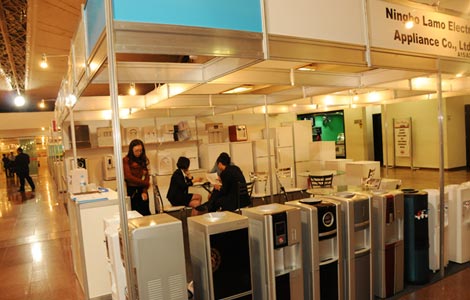Cross-border e-commerce booming
Updated: 2014-12-01 10:57
By XIAO LIXIN in Beijing(China Daily USA)
|
||||||||
With a record 278 million orders totaling $9.34 billion in sales, China's Singles' Day shopping spree on Nov 11 set the table for its US counterpart, Black Friday, which this year joined the e-commerce market in China for the first time.
Promotional pages on major online websites beckoning Chinese shoppers to buy overseas have emerged on both Amazon China's Z.cn and g.taobao.com, the global shopping channel of China's e-commerce platform Taobao, as well as The Store's yhd.com and Suning.com.
From 9 am Beijing time on Nov 28, Amazon China unveiled its version of Black Friday: a two-day overseas shopping campaign that offered more than 35,000 products discounted by up to 70 percent. Amazon China, which started pilot run on Nov 11 for overseas shopping, which was in full swing on Nov 28, Black Friday.
According to Doug Gurr, president of Amazon China, Z.cn's most recent overseas shopping platform generated more than a million page views on the pilot run's first day and an unexpected growth in clicks in seven major categories such as baby products and clothes.
About 800,000 international-brand products have been offered on Amazon China.
"Chinese consumers can enjoy the same exclusive holiday discount as in the US during the Black Friday,"Gurr said.
In response to the Black Friday shopping extravaganza, Alipay distributed 400,000 coupons worth 60 million yuan ($9.77 million) from Nov 24 to Dec 1, as a move to encourage registered uses to try cross-border shopping.
Apart from still providing a trustworthy platform for Chinese online consumers to shop from registered stores selling overseas products on Taobao, Alipay has taken other approaches.
Four high-end US retailers - Macy's, Saks Fifth Avenue, Neiman Marcus and Bloomingdale's - as well as iHerb and apparel stores such as Aeropostale allowed online payment through Alipay.
It means that Chinese shoppers can log onto the online stores with their Alipay accounts, and pay in renminbi with Alipay in the final payment section without applying for a dual-currency credit card and waiting for the arrival of the purchased goods at home. It was similarly as easy as shopping on Taobao, only with a but longer shipping period of two weeks on average.
Before, Chinese shoppers had to find an overseas transit logistics company to complete the delivery both within the US and China.
As the competition between domestic online retailers and shopping sites gets fiercer with surging consumption, cross-border e-commerce has developed and expanded quickly the last couple of years. The huge size and potential of the market have attracted global attention and global competition.
According to the statistics from the Ministry of Commerce, China became the largest e-retailing market in 2013, with online-retail volume jumping to 1.85 trillion yuan ($301.2 billion), a year-on-year growth of 41 percent.
Therefore, "more e-retailers have set foot in the cross-border transactions than previous years, especially after the establishment of Shanghai Free Trade Zone since 2014”, said Mo Daiqing, an analyst with the China e-Business Research Center.
The State Council issued a guideline in May to facilitate the country's cross-border e-commerce.
With big price disparities between the same products overseas and in China, more consumers will make cross-border direct purchases via different domestic and overseas online platforms and e-retailers, Mo said.
xiaolixin@chinadaily.com.cn
Most Viewed
Editor's Picks

|

|

|

|

|

|
Today's Top News
New visas a boon to real estate
China records 497,000 people with HIV/AIDS
Ailing school district seeks Chinese help
Web options proliferate for Chinese shoppers
Artists seek US audiences
Alibaba, Amazon in online battle
HK protesters clash with police outside govt headquarters
Cross-border e-commerce booming
US Weekly

|

|















